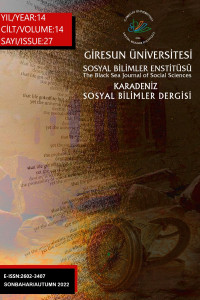Öz
This study aims to find whether the mathematical achievement levels of preschool children, who are at the beginning of their educational journey, differ by gender. Meta-analysis, which is one of the systematic synthesis methods, was used in the study. Etymologically, meta-analysis means the combination of the results of multiple scientific studies. Moreover, meta-analysis refers to deriving a general result by combining the findings of different studies or reanalyzing the findings of a given study. Theses and studies accessible in the CoHE National Thesis Center, Google Scholar, and the Turkish National Academic Network and Information Center and published between 2005 and 2021 were reviewed. In this study, based on the assumption that the differences between the findings on mathematical achievement levels of the studies included in the meta analysis do not arise from sampling errors, a random-effects model was used. The average effect size of the random-effects model was calculated as 0.41. This result indicates that the mathematical achievement levels of preschool children do not vary by gender in Turkey.
Anahtar Kelimeler
Kaynakça
- Alkhateeb, H. (2001). Gender differences in mathematics achievement among high school students in the United Arab Emirates, 1991-2000. School Science and Mathematics, 101(1), 5-9. Aunio P., Ee J., Lim S. E. A., Hautamäki J., & Van Luit J. H. (2004). Young children's number sense in Finland, Hong Kong and Singapore. International Journal of Early Years Education, 12(3). 195-216. doi: 10.1080/0966976042000268681
Türkiye'de Okul Öncesi Dönemde Cinsiyetin Matematik Becerisi Üzerindeki Etkisi: Meta Analiz Çalışması
Öz
Araştırmada sistematik sentezleme yöntemlerinden biri olan meta analiz yöntemi kullanılmıştır. Meta-analiz kelime anlamı açısından incelendiğinde, analizlerin toplanması ya da üst analiz anlamına gelmektedir. Ayrıca meta-analiz farklı çalışmalardan elde edilen sonuçların birleştirilerek genel bir sonuç elde edilmesi anlamına geldiği gibi bir çalışmaya ait sonuçların tekrar analiz edilmesi anlamına da gelmektedir. Bu çalışmada çocukların eğitim süreçlerinin başlangıç noktası olan okul öncesi dönemde matematik becerilerinin cinsiyete göre farklılık gösterip göstermediği ortaya koyma amaçlanmıştır. Meta analize dahil edilecek çalışmaların belirlenmesinde 2005-2021 yılları arasında Yüksek Öğretim Kurumu Ulusal Tez Merkezi, Google Scholar ve Ulakbim’deki tez ve makaleler taranmıştır. Bu araştırmada, meta-analize dahil olan çalışmalarda raporlanan matematik becerisine ilişkin farklılıkların örnekleme hatasından farklı olduğu varsayılarak rastgele etkiler modeli kullanılmıştır. Rastgele etkiler modeline göre ortalama etki büyüklüğü 0,41 olarak hesaplanmıştır. Bu sonuç bize Türkiye’de okul öncesi dönemde çocukların matematik becerilerinin cinsiyete göre farklılaşmadığını göstermektedir.
Anahtar Kelimeler
Okul öncesi Matematik Cinsiyet Meta-Analiz Preschool Mathematics Gender Meta-Analysis.
Kaynakça
- Alkhateeb, H. (2001). Gender differences in mathematics achievement among high school students in the United Arab Emirates, 1991-2000. School Science and Mathematics, 101(1), 5-9. Aunio P., Ee J., Lim S. E. A., Hautamäki J., & Van Luit J. H. (2004). Young children's number sense in Finland, Hong Kong and Singapore. International Journal of Early Years Education, 12(3). 195-216. doi: 10.1080/0966976042000268681
Ayrıntılar
| Birincil Dil | Türkçe |
|---|---|
| Bölüm | Makaleler |
| Yazarlar | |
| Erken Görünüm Tarihi | 22 Ekim 2022 |
| Yayımlanma Tarihi | 31 Aralık 2022 |
| Gönderilme Tarihi | 31 Ekim 2022 |
| Yayımlandığı Sayı | Yıl 2022 Cilt: 14 Sayı: 27 |


